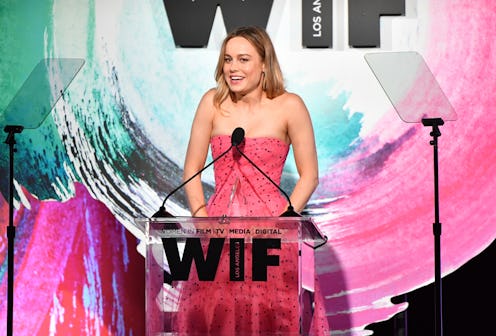Entertainment
Brie Larson's Comments About Diversity In Film Criticism Are SO Important

At the 2018 Women In Film Crystal + Lucy Awards, Oscar winner Brie Larson accepted the final award of the evening for "Excellence in Film". During her acceptance speech, Brie Larson demanded more diversity in film criticism, choosing not to give the boilerplate "I'd like to thank so-and-so" speech in favor of a rousing call to action. Her speech is beyond powerful — and is already garnering support from fellow women in the industry.
Larson has long used her platform and privileged status — as a young, white, Oscar-winning actor — to call attention to marginalized groups in the industry, particularly since many of them may not have received the same opportunities in their careers. In this instance, she chose to address the glaring lack of diversity in film criticism. On June 11, just a few days before the Film Crystal + Lucy Awards, the 2018 USC Annenberg Inclusion Initiative report was released, and it made plain the glaring lack of diversity in film reviewing. (For example, the study, which looked at all the reviews on Rotten Tomatoes for the 100 top grossing films of 2017, revealed that just 4.1 percent of high-profile criticism last year was contributed by non-white women.)
Larson spoke specifically about the Ava DuVernay film A Wrinkle In Time, which, according to Rotten Tomatoes, did not do well among the critics. The film scored a 40% on Rotten Tomatoes from critics, and reached a paltry 30% fresh rating from audiences, which, of course, can be unconsciously swayed by critics. Those assessments may not have been fair, and could affect the future of the filmmakers involved with A Wrinkle In Time — two things Larson is well aware of, and is determined to not let happen.
Speaking specifically about the critical reaction to A Wrinkle in Time, Larson said the following:
“Am I saying I hate white dudes? No, I’m not … [but if] you make the movie that is a love letter to women of color, there is an insanely low chance a woman of color will have a chance to see your movie and review your movie.”
As the Rotten Tomatoes score shows, critics weren't exactly generous in their reviews of DuVernay's adaptation. And one could make the case that the film's less positive reviews were in part influenced by the demographics of professional film critics. The large majority of critics — who are male and white — simply were not the target audience for A Wrinkle in Time.
As Larson pointed out in her speech, the movie wasn't made for the older white men who make up the critic demographic, so why did they write the bulk of the film's reviews? Where are the reviews from the people for whom DuVernay made the film? Larson made the case that women, young women, and young women of color especially — those are the voices audiences should pay attention to, particularly for a film like this. Yet "[audiences] are not allowed enough chances to read public discourse on these films by the people that the films were made for," Larson declared, continuing:
"I do not need a 70-year-old white dude to tell me what didn’t work for him about A Wrinkle in Time. It wasn’t made for him. I want to know what it meant to women of color, to biracial women, to teen women of color, to teens that are biracial."
It's difficult for anyone to admit when they have a blind spot, but decades of professional film criticism does not compare to lived experiences. And, as many have pointed out before, sometimes critics can be unknowingly tough on films that don't specifically cater to their stories or interests. So it's entirely possible, as noted in a 2016 essay on Slate, that the dearth of non-male reviewers at major publications has been negatively impacting the film industry for an unknowable amount of time.
Larson recognized that criticism is an integral part of the industry in her speech. The problem is, when the critics themselves are overwhelmingly homogenous, it affects the film industry at every level. If critics are the gatekeepers for success, and they're overwhelmingly older, straight, white men, then that narrows everyone's opportunities. As the Captain Marvel star explained:
"It really sucks that reviews matter. Good reviews out of festivals give small, independent films a fighting chance to be bought and seen, good reviews help films gross money, good reviews slingshot films into awards contenders, a good review can change you life."
It's obvious that the demographics of industry critics need to change as the demographics of filmmakers and actors continue to shift. Hollywood can't ignore the fact that critics are overwhelmingly white and male anymore. Larson's ready for this to change at every level — and she'll lead the way, if she has to.
Fellow A-list celebrities and champions for diversity DuVernay and Jessia Chastain are with her on it.
Larson isn't just talking the talk, either. The actor also announced that the Sundance Institute "pledged to give at least 20 percent of their top-tier press passes" at the 2019 Sundance Film Festival to "underrepresented groups," and mentioned that The Toronto Film Festival is considering a similar action, per IndieWire.
After all, critics from minority groups exist — they always have — but the opportunities for professional advancement, for the chance to be taken seriously, have long been scarce. If the industry listens to Larson, though, this could all be about to change.